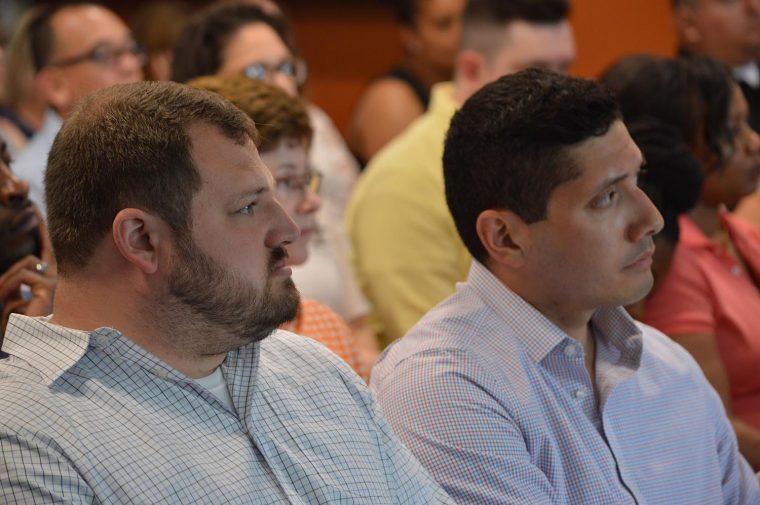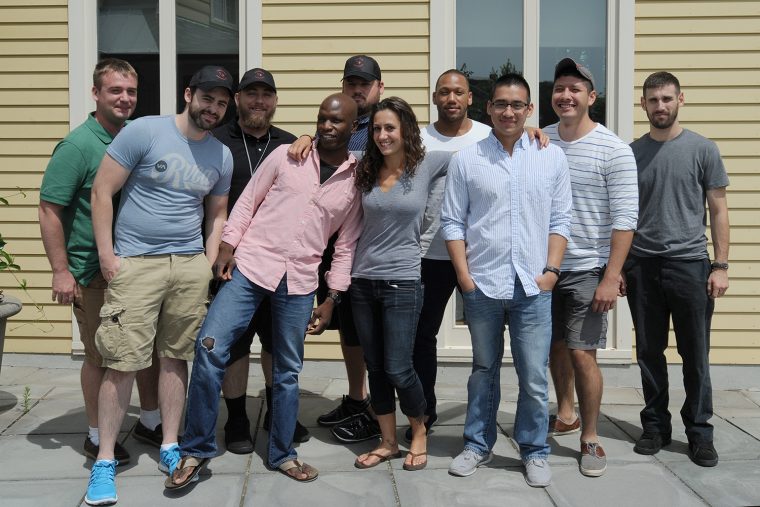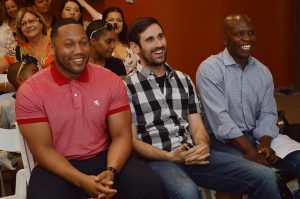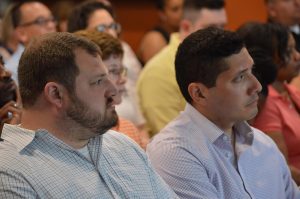First Cohort of Posse Veteran Scholars Graduates


As the Class of 2018 accepted their diplomas this month, among them was a special group of students: Wesleyan’s first full cohort of Posse Veteran Scholars to graduate.
In 2013, Wesleyan made a commitment to dramatically increase the number of veterans it enrolls by entering into a new partnership with The Posse Foundation, Inc. At that time, Wesleyan was only the second institution to join the Posse Veteran Scholars Program, which identifies talented veterans interested in pursuing bachelor’s degrees, and places them at top tier colleges and universities, where they receive four-year full scholarships. Each year, the veterans enter in “posses” of 10, which act as support networks to help these nontraditional students adapt to college life. As of the 2017–18 school year, Wesleyan has enrolled four full cohorts. One member of the first posse, Ky Foley, graduated a year early in 2017.
Before arriving at Wesleyan, members of the Class of 2018 Posse Veteran Scholars were members of the Army, Navy, Air Force, and Marine Corps, and several served in Iraq and Afghanistan. Some had previously attended other colleges and universities; two have families.
Andrew Szegedy-Maszak, Jane A. Seney Professor of Greek, professor of classical studies, is the faculty mentor for the Class of 2018 posse.
“I’ve often said that the Posse initiative is one of the best things Wesleyan has done, and I still believe that,” he said. “Being the mentor for the first cohort has been at various times rewarding, challenging, frustrating, infuriating, and joyful, but never dull.”

Antonio Farias, vice president for equity and inclusion, Title IX officer, agreed.
“Without question, the partnership with the Posse Foundation and the influx of a critical mass of post-9/11 veterans on campus has been an overwhelming success,” he said. “The Posse Veteran Scholars are exceptional human beings who contribute across the board to the living-learning environment, and demonstrate the vast talent pool that exists within this particular nontraditional student population.”
Yet, figuring out how to help the Posse vets succeed and thrive at Wesleyan—both academically and socially—presented certain challenges.
“Among the most important things I learned is that, unlike most of our traditional undergrads, the vets bring with them the military idea that they shouldn’t admit that they’re having trouble. They’re reluctant to ask for help, and they can be extremely stubborn,” said Szegedy-Maszak. “Once they see that the University has resources they can draw on, they use what we can provide, and they go on to make the most of their Wesleyan experience. Mentoring the Posse vets has helped me be more attentive to all my students.”

Farias added that, as with any pilot program, over the past four years, he and others have learned a lot about what works for this group of students in terms of support services, early interventions, housing, child and family care, and faculty mentoring.
“Most importantly, we’ve learned to listen with intent to the vets themselves and provide them the same opportunity to co-create their experience and to shape the experience of future cohorts of vets at Wesleyan,” he said. “I see our veteran initiative as part of a broader project to create equitable access to the transformational educational experience that Wesleyan provides.”
Below, a few Class of 2018 Posse Veteran Scholars share their experiences:
Name: Andrew Olivieri
Hometown: New York City
Branch of Service: U.S. Army
Major at Wesleyan: Government
Plans for after graduation: Consulting at Booz Allen Hamilton in Washington, D.C.
What surprised you most about your experience at Wesleyan?
I was surprised how welcoming and eager the students were to talk to veterans and invite us into their space. I’ve never felt like an outsider in my four years at Wes.
What was the most valuable thing you learned during your time at Wes?
The most valuable thing I learned was confidence in my writing. I barely graduated high school when I was younger and I wasn’t sure if I could make it at a school like Wesleyan where most of the students were at the top of their class. It took me a month to write my first paper at Wes and I was in awe of other students who could write it the night before. Professors eviscerating my paper with red marks helped me become a better writer, and I’m grateful for that.
What advice would you give another service member considering pursuing a college degree?
Be a Wes student. I wrote an article for the Argus regarding this a couple years back. Basically, veterans shouldn’t isolate from the campus because they believe they are too old or that civilians won’t understand them. They’re robbing themselves of an opportunity to develop in other ways. School shouldn’t feel like a 9 to 5 job. Get out there and enjoy college life.
Name: Michael Smith
Hometown: Chicago
Branch of Service: U.S. Marine Corps/U.S. Army
Major at Wesleyan: College of Social Studies
Plans for after graduation: Still unfolding
What surprised you most about your experience at Wesleyan?
I was most surprised by how interested professors are in making themselves available to students. While I had heard that professors were invested in the success of their students, I was not sure how much of this was empty rhetoric versus reality. In the majority of my experiences, I’ve found my professors were as interested in me, if not more, as I was interested in them.
What was the most valuable thing you learned during your time at Wes?
In most cases, student’s interests, academic or otherwise, are achievable. In cases where the University lacks resources specific to one’s interest, if the student is persistent, someone on campus can connect you to resources outside of Wesleyan.
What advice would you give another service member considering pursuing a college degree?
Ask for help early and often. Don’t wait until you feel underwater. Know that everyone wants us to succeed. If nobody is aware of struggles you might be experiencing, they can’t offer the necessary support.
Name: Royce Ebenal
Hometown: Saratoga Springs, N.Y.
Branch of Service: U.S. Army
Major at Wesleyan: Physics and Mathematics
Plans for after graduation: Quantitative analyst at a small tech company
What surprised you most about your experience at Wesleyan?
That I’m going to start working after senior year instead of pursuing an engineering degree at Dartmouth.
What was the most valuable thing you learned during your time at Wes?
Be open to new opportunities when they present themselves and don’t be afraid to take risks.
What advice would you give another service member considering pursuing a college degree?
Challenge yourself. No course at Wesleyan is too difficult if you put in the time and energy and work hard. At the end of the course, you might be surprised by how much you are able to learn.

